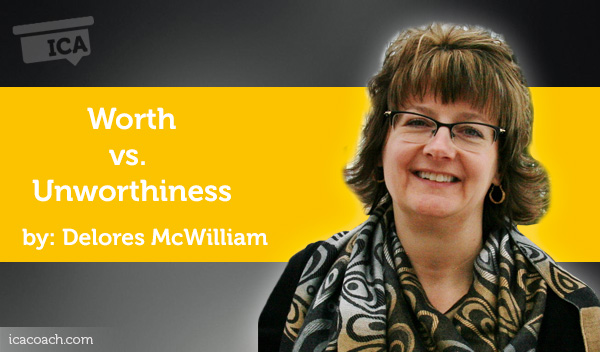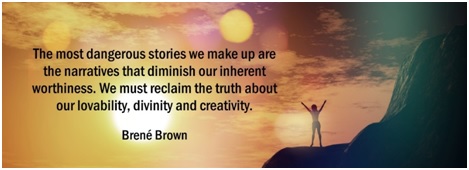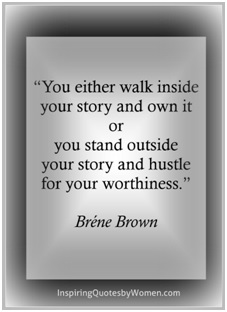
A Coaching Power Tool Created by Delores McWilliam
(Christian Life Coach, CANADA)

So often, what I have discovered with my women clients is that there is a holding back or “stuck-ness” in what they really want to be doing and achieving. Once we have dug into the matter further, more often than not,I hear “I don’t feel worthy to receive …” In other words, “I don’t feel that I deserve what that next step brings because of what I have failed to do in this step.”
That failing could be a perception of underachieving goals, looking less beautiful than someone else, earning less money, feeling like a less than perfect parent, carrying extra weight, or not working in an ideal job. Most often these perceptions are based on someone else’s opinion of you. Who are these people and how do they somehow achieve the status of “worthiness decider?” And how is it that we have allowed their factors for worthiness to become our factors for worthiness?
Merriam-Webster defines worth as 2: the value of something measured by its qualities or by the esteem in which it is held. 3a: a moral or personal value.
From this definition, it seems reasonable that the value (worth) of ourselves could be measured by the one holding these qualities (you) or by someone else.
When we allow and accept someone else’s picture of what worthiness is, it’s important to know that it is based solely on their opinion. Interestingly, the opinion that is expressed is sometimes from someone we may not even like or respect. So how then does such an important value get determined by someone else?
Some possibilities are:
- 1. We desire some characteristics of another person(s) and wish to emulate that in ourselves. It could be their level of success, appearance, personality etc…
- Society’s (media) standards have been ingrained in us of what worthiness “should” be and we buy into it (literally and figuratively).
- It was taught to us beginning at a young age and it has always been considered our “truth”.
- It was imposed upon us as a rule or law by someone in authority and is ingrained into our very moral fabric.

When we “buy into”the standards of someone else or societal standards, we tend to think that by acquiring “stuff” we will have more “worth”. This typically results in desiring things that may not hold a high value to us. Society has taught that getting an advanced education will lead to worthy careers, which will give us a great paycheck(more money = more worth). If we don’t have all manner of “stuff”, then we chase after it. What is interesting is that even though we chase after things, we may not even want them. Consider someone becoming a police officer because they believe that will bring status and status = worth. But what if you really want to be a truck driver, then becoming an officer leaves you with the status, but unfulfilled. It seems that many times we may just want the feeling of worth that is associated with achieving or acquiring something. This in turn leaves us empty and longing for the next thing that will bring a feeling of self-worth.
An additional problem with allowing our picture of personal worthiness to come from an outside source is that it will most likely never be achievable. The factors will always be changing based on what is happening in the other person’s life or within society. When we have established and live a life according to our own basis for self-worth, we operate within our own possibilities for the greatest successes. It is generally understood that people who set their own measure for self-worth, tend to live happier, more peaceful, satisfied, fulfilled and directed lives. So how can we design a picture of self-worth that is “worthy” to call our own?
Self Application
When was the last time you paused to consider what self-worth means to you? What factors do you consider when deciding the worth of something (it could be a relationship, material item, yourself)? Have you recently thought about what you are good at? What ways do you pour positively into the lives of others that might bring joy to your own life? What are your achievements – whether big or small? Think about the last time someone complimented you – how did that feel? What value do you bring to personal or business relationships?
Once you start analyzing these questions – really by reframing your perspective, you can see a picture of your personal worth in your world. Next, consider attaching a gratitude to each one. Gratitude plays a role here because when we are grateful for something, it is very difficult to remain in a negative mindset like that surrounding unworthiness.
For example:
At the company Christmas party, Sheila commented that she really appreciated the report that Julie prepared for the finance committee. Sheila applauded her attention to detail and flawless reporting, and was especially happy to end the meeting early.
If Julie approached this scenario from an unworthy mindset, it could easily take Julie on a path that looks like this: “Well no one else noticed my hard work. Looks like it still wasn’t good enough to get noticed for promotion. Does anyone else care that they got to go home early?”
Now if Julie approaches the same scenario from a worthiness mindset it could look like this: “I am so grateful for the extra attention and diligence that I poured into that report. I am so thankful that it was noticed. How kind of Sheila to let me know she appreciated all that I did. And hey, everyone got to go home early. I’ll continue to work to my standards and maybe one day it will pay off with a promotion.”
We can see by this simple scenario that by placing gratitude alongside what we are doing, our whole outlook can change for the positive helping us to cement our feelings of worthiness to ourselves and to the world.
Caching Application
In addition to using the above exercise for your client, consider asking your client to think about all their achievements. Ask if they have become dependent on these achievements to be happy, fulfilled or that they help with living a purpose-filled life. Now ask them to take their list of the important achievements and separate themselves from the achievement.
For example:
By using this exercise to explore these achievements, we can see that what the world puts worth into, has not changed the basic fabric of who we are. Our identity is NOT in these achievements or material items.
As a coach, it is important to uncover what is happening when there is a noted lack of personal worthiness. Is there an underlying belief surrounding the client’s worthiness and perhaps a lack of confidence due to it? By creating awareness of the factors surrounding these ideas, breakthrough into what the client truly values as a basis for worthiness begins to emerge. Another exercise for creating awareness is to ask your family and friends to tell you what 3 things they admire and appreciate about you. This helps the client “see” what others see that is special about them.
Once awareness is created, building a new concept of personal worthiness can happen. Based on the client’s core values and a gratitude for what special qualities they already possess, a healthy understanding of her/his worthiness can be rebuilt. Structures for creating a lasting adherence to this new learning is important. Some clients have found visualizing themselves in an ideal day and the people that are encouragers surrounding them. Other structures might look like a reward at the end of a project, keeping a journal of your accomplishments and noting how thankful you are for each one.
What happens when we “violate” our standard for worthiness?
An important consideration is what happens when we make a mistake or don’t measure up to our self-worth ideals?
As a coach, when helping a client design their parameters of self-worth, some considerations need to be made for:
- Human error. (ex. I swore at that guy and I never should have done that)
- Human condition (a bad day for example).
- The understanding that the client may need to revisit their statement of self-worth periodically to ensure it continues to be in line with their values.
If we violate our boundaries, then we will certainly be made aware of our crossing the line by our conscience. It is at this time that the situation can be looked at for what it is (a mistake perhaps) and then a new resolve to continue to pursue the desired standard of worthiness.
Knowing your worth gives you a solid framework in which to have freedom to pursue your desires and goals. You don’t have to pursue beyond what you know in your heart to be right for you. There is total freedom by taking the time to understand what your worth is. It is only by knowing this that we become true to ourselves knowing who we are and how valuable we are in this world. It is also the realization that our value does not suddenly become null and void if others don’t agree. Their opinion and the opinion of society does not get to dictate our sense of worth.

References:
https://beingholyandhealthy.com
https://www.merriam-webster.com/dictionary/worth